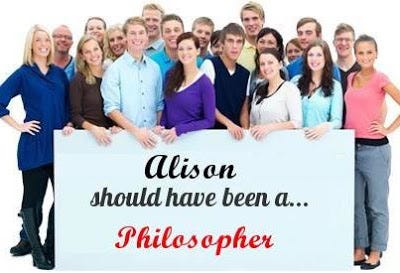The pleasures and sorrows of work

This is perhaps old information to many, and I went to hear Alain de Botton speak at the Opera House on the topic some years ago myself, but I am just now reading through his book The Pleasures and Sorrows of Work. (Then to my amusement I did what all intelligent, sensible and God-fearing folks do and had a go at a Facebook application that determines your vocation based on nothing but your date of birth, and got the result above.) I don’t especially want to keep doing what I am doing for work, but I don’t altogether know where to go next either. The problem isn’t that I don’t know what it is I love to do. I do. The problem is just how to turn any or all of those things into something that generates a stable income. In truth, I also hoped that I might be entrusted with children to raise, but as that requires that a Christian guy ask me out, which is the impossible dream I don’t see being realised any time soon (and time is running out), I can’t consider that an option. So I feel like I am in a strange place where the things I would love to do either don’t lend themselves to a secure income, or are not things that I can plan/take action towards. And at the moment I feel like work is something I do to earn some money, and I do what I enjoy doing in my spare time, but perhaps the two don’t have to be so mutually exclusive, and I'd like to be a little closer to the 'coal face' of what matters than I am now.
So I was interested in this section of Alain de Botton’s chapter where he spends some time with a career counsellor. I don’t necessarily endorse all that he says, but it is curious that this notion of a ‘calling’ gets links to Christianity, and that only from the medieval times. What he writes in the second part is also strangely comforting.
... he remarked that the most common and unhelpful illusion plaguing those who came to see him was the idea that they ought somehow, in the normal course of events, to have intuited – long before they had finished their degrees, started families, bought houses and risen to the top of law firms – what they should properly be doing with their lives. They were tormented by a residual notion of having through some error or stupidity on their part missed out on their true ‘calling’.
This curious and unfortunate term had first come into circulation in a Christian context during the medieval period, in reference to people’s abrupt encounter with an imperative to devote themselves to Jesus’ teachings. But Symons maintained that a secularised version of this notion had survived even into the modern age, where it was prone to torture us with an expectation that the meaning of our lives might at some point be revealed to us in a ready-made and decisive form, which would in turn render us permanently immune to feelings of confusion, envy and regret.
Symons preferred a quote from Motivation and Personality, by the psychologist Abraham Maslow, which he had pinned up above the toilet: ‘It isn’t normal to know what we want. It is a rare and difficult psychological achievement.’ (pg 113)
...
The true range of obstacles in the way of unlocking our potential was more accurately acknowledged by the German sociologist Max Weber when, in his essay ‘Science as a Vocation’ (1918), he described Goethe as an example of the sort of creative and healthy personality ‘who appears only once in a thousand years’.
For the rest of history, for most of us, our bright promise will always fall short of being actualised; it will never earn us bountiful sums of money or beget exemplary objects or organisations. It will remain no more than a hope carried over from childhood, or a dream entertained as we drive along the motorway and feel our plans hovering above a wide horizon. Extraordinary resilience, intelligence and good fortune are needed to redraw the map of our reality, while on either side of the summits of greatness are arrayed the endless foothills populated by the tortured celibates of achievement.
Most of us stand poised at the edge of brilliance, haunted by the knowledge of our proximity, yet still demonstrably on the wrong side of the line, our dealings with reality undermined by a range of minor yet critical psychological flaws ... We are like an exquisite high-speed aircraft which for lack of a tiny part is left stranded beside the runway, rendered slower than a tractor or a bicycle.
I left Symon’s company newly aware of the unthinking cruelty discreetly coiled within the magnanimous bourgeois assurance that everyone can discover happiness through work and love. It isn’t that these two entities are invariably incapable of delivering fulfilment, only that they almost never do so. And when an exception is misrepresented as a rule, our individual misfortunes, instead of seeming to us quasi-inevitable aspects of life, will weigh down on us like particular curses. In denying the natural place reserved for longing and error in the human lot, the bourgeois ideology denies us the possibility of collective consolation for our fractious marriages and our unexploited ambitions, and condemns us instead to solitary feelings of shame and persecution for having stubbornly failed to become who we are. (pg 127)

